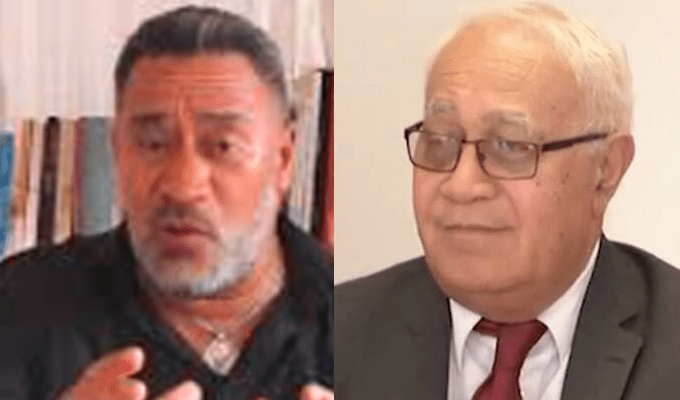Lawyer Nalesoni Tupou has accused Professor Siosiua Lafitani of lying and challenged his legal expertise after Lafitani claimed that Tupou was not telling the truth when commenting on matters related to the kingdom’s democracy.

The Auckland-based Tongan lawyer was responding in support of a previous editorial by Kaniva News debunking Professor Lafitani’s claim that Tonga’s 2010 political reform was not a change to democracy.
Tupou and Kaniva News are among a number of media personnel Lafitani has accused of promoting speculative information (“fakanāfala”) and unenlightened thinking (“fakakaukau fakapo‘uli”) because of his view that Tonga is not a democracy.
Lafitani has continued his attack against Kaniva News editor Kalino Latu. We will respond to that in a separate story shortly.
As our editorial mentioned previously, Lafitani also made untruthful claims including allegations that he was the first scholar to have introduced the idea of democracy to Tonga in 1988.
He also claimed that the word democracy was not written in the Tongan constitution and that was why he believed Tonga was not a democratic form of government.
After Kaniva News ran the editorial with supporting evidence refuting Lafitani’s false claims Tupou shared the editorial on Facebook warning Lafitani that we had printed the truth.
“Loi ‘a Lafitani”, Tupou wrote in Tongan, saying Lafitani was lying.
Tupou told Lafitani he, as a lawyer, had successfully represented court cases in Tonga which had been based on democratic principles.
Tupou contacts Lafitani
Lafitani claimed in his response to Kaniva News’ editorial on Facebook that Tupou had contacted him after the story was published.
In their communication, Tupou asked Lafitani to correct his claims reported by Kaniva News.
Tupou also wanted to know about Lafitani’s expertise in law and constitution.
He said Lafitani was a “social scientist and anthropology scholar . . . . never a scholar of law or constitutional law.”
He asked Lafitani about the location of his Lo‘au University and whether it was registered in Tonga or Texas. He also wanted to know who was funding his university.
Lafitani’s responses
Lafitani declined to respond to Tupou’s inquiries whether he was qualified in law and constitutional matters.
He also refused to respond to the queries about his university’s registration and who was funding it. He claimed that Tupou’s queries were of a personal nature, drawing a parallel with the Tongan practice of “lau ako mo lau ngaue,” which involves the practice of bragging about one’s intelligence and achievements.
He insisted that Tupou’s queries should have been directed to the Lo‘au University’s board of directors, but said the University was not accountable to Tupou.
Regarding his claim that he was the first person to introduce democracy to Tonga in 1988, he told Tupou he and Kaniva News should do thorough research about his 1988 speech. He failed to mention that we pointed out that the Late ‘Akilisi Pohiva’s Matalafo Laukai radio programme had introduced the idea of democracy to the country in 1981, seven years before Lafitani’s speech.
This was followed by the Kele‘a newspaper, which was established in 1986 to pursue the Matalafo Laukai programme after the government banned it in 1983. Pohiva was dismissed from the public service as a teacher in 1984 because he openly shared his ideas for a democratic government.
Lafitani also claimed that his lecturer, Professor Futa Helu of ‘Atenisi University, was unhappy about his speech and told him in Tongan that he was “kaaimu’a.” This is a negative saying similar to English proverb “the early bird catches the worm.” In this sense, it means Professor Helu wanted to be the one who first made such a speech about democracy.
Editor’s comment:
Professor Lafitani should be transparent about his background and his university. He was the one who first made serious accusations against Tupou and Kaniva News.
He has promoted his university to the public, so the public, including Tupou, has the right to know everything about the university including who is funding it and whether it is registered or not.
These are essential requirements that are common in most recognised universities in the Pacific, including New Zealand and Australia.
Those universities have official websites in which everything about the institutions such as lecturers’ qualifications and backgrounds, constitution, policy, contacts, schedules, courses and a repository for their students’ research thesis and dissertations are made available to the public.
Lo‘au University no longer appears to be operating its two websites, known previously as Nuama and Lo‘au ‘University. It appears the University is now being operated through Facebook and has some videos on Youtube.
The university was launched by Minister for Education Dr. ‘Ana Maui Taufe’ulungaki on January 7, 2014. It was described by the media at the time as “Tonga’s first online virtual university.”







